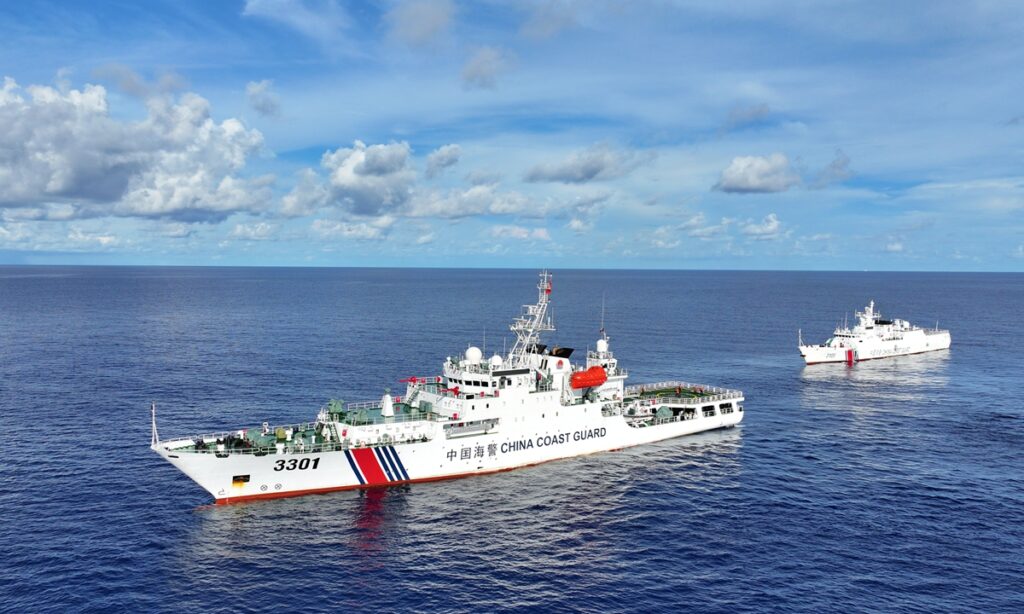Philippines’ move aimed at bolstering ‘victimhood narrative’ with incitement
The Philippines has continued to neglect China’s goodwill efforts to calm tensions by sending a Philippine Air Force aircraft to illegally enter the airspace over China’s Huangyan Dao (also known as Huangyan Island) in the South China Sea on Thursday, and issuing a complaint on Saturday over the professional and legitimate actions by the Southern Theater Command of the Chinese People’s Liberation Army (PLA) in response to such intrusion.
Chinese observers and military experts on Sunday slammed the Philippines’ latest actions, calling them a petty attempt to constantly bolster Manila’s victimhood narrative in the South China Sea. They emphasized that the Chinese military’s response was unarguably responsible, restrained, and fully compliant with international laws and norms.
A Philippine Air Force NC-212 aircraft had illegally intruded into the airspace over Huangyan Dao in the South China Sea on August 8, interfering with China’s regular training activities despite repeated warnings from the Chinese side, read an official release by the PLA Southern Theater Command on Saturday.
The theater command deployed maritime and aerial forces to identify, verify, track, monitor, warn and drive the intruding aircraft away in accordance with law. The operation was conducted professionally, with adherence to legal standards, theater command said.
China holds indisputable sovereignty over Huangyan Dao and adjacent waters. The theater command’s troops remain on high alert, and are committed to safeguarding national sovereignty and security, while also maintaining peace and stability in the South China Sea, it said.
However, the Philippine military on Saturday complained about Chinese military’s actions, claiming them as “dangerous and provocative,” and according to media, it marked the first time the Philippines has complained of actions by Chinese aircraft, as opposed to navy or coast guard vessels, since President Ferdinand Marcos Jr took office in 2022.
The Philippine military claimed on Saturday that two Chinese Air Force aircraft “executed a dangerous maneuver” and dropped flares in the path of a Philippine air force aircraft conducting a so-called routine patrol over the Huangyan Island on Thursday morning.
The fact that the Philippines has dispatched Air Force aircraft to harass the Chinese military’s normal activities around Huangyan Island, proves the continuous escalation in their provocative behavior, said Chinese military expert Zhang Junshe. The Chinese military’s normal exercises around Huangyan Island are justified, reasonable, and lawful. In response to the Philippines’ provocative actions, the countermeasures taken by Chinese military are legal and professional, fully in accordance with international law and practices, and beyond reproach, Zhang noted.
Objectives behind move
With the aim of testing reconnaissance, early warning, rapid deployments and joint strike capabilities, the Chinese People’s Liberation Army (PLA) Southern Theater Command on Wednesday organized a joint combat patrol in waters and airspace near Huangyan Dao in the South China Sea.
The blatant provocation in the South China Sea serves Manila’s multiple objectives including spying on and reconnaissance over China’s exercise training activities near Huangyan Island, possibly seeking to provoke China to gauge the reaction, Ding Duo, a deputy director of the Institute of Maritime Law and Policy from the China Institute for South China Sea Studies, told Global Times on Sunday.
The NC-212, a small transport aircraft, may also be carrying journalists in addition to military personnel, with the possibility that American personnel also being aboard disguised as journalists as the Philippines aims to gather material to continue hyping up maritime issues and exaggerate the so-called “China threat,” Ding pointed out.
Moreover, the Philippines has not abandoned its illegal territorial claims over Huangyan Island and is attempting to assert its so-called “territorial claims” through this latest action, he said.
Last month, China and the Philippines reached a provisional arrangement on humanitarian resupply of living necessities to a Philippine warship illegally grounded at Ren’ai Reef.
However, on the international stage, Manila continues to portray itself as a victim and exaggerate the “China threat,” a strategy that is unlikely to change fundamentally, observers pointed out.
Moreover, the Philippines’ provocations are not limited to Ren’ai Reef, but also targeted Xianbin Reef, Huangyan Island, and other locations, often in coordination with non-regional countries through joint exercises aimed at China.
GT




